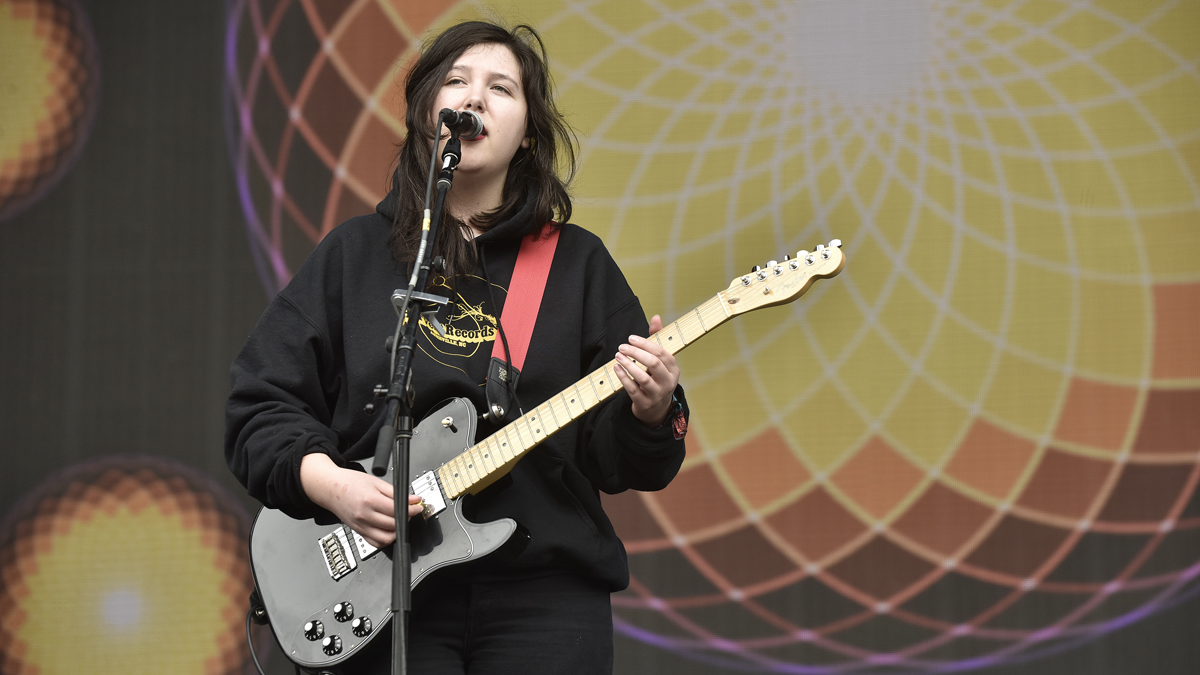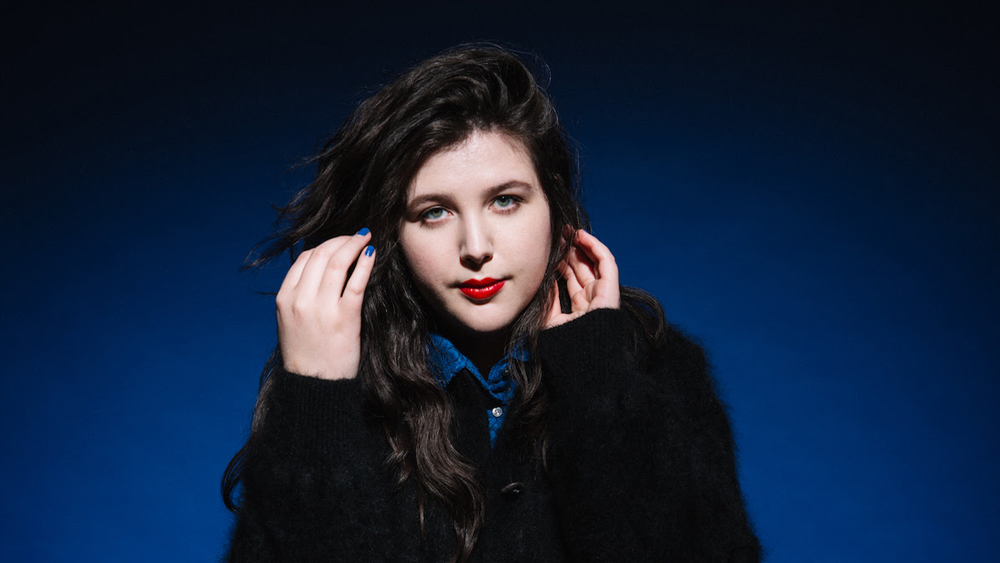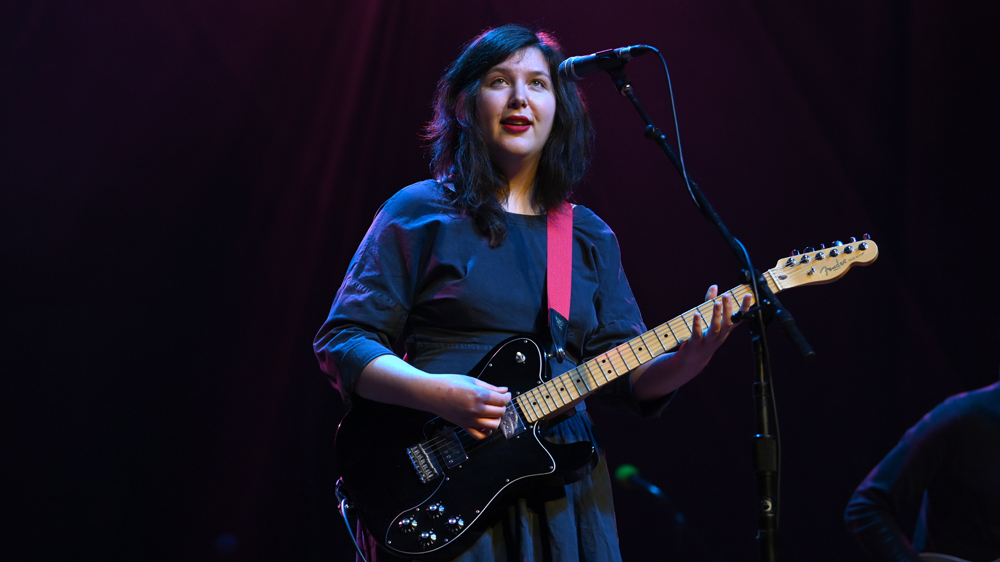Lucy Dacus: "One piece of advice I would give to anybody: get a bad guitar. It's almost like a blank slate and creates a sense of freedom"
The boygenius singer-songwriter on the pressure of unrealistic creative expectations, the standout six-string moments of new album Home Video, and why bad guitars often help write the best songs

Virginian songwriter Lucy Dacus has fast formed a formidable reputation as a writer of autobiographical songs that are intelligent, funny and stunningly constructed.
2018’s Historian cemented this, revisiting the diaries she’s kept throughout her life and blending them into self-reflective, humorous snapshots. The opening line, “The first time I tasted someone else’s spit, I had a coughing fit,” drifted in calmly over the clean rumble of a baritone electric.
Her third record is titled Home Video, but her new catalog of songs can perhaps be better thought of as ‘documentaries’. It refines the writing process of Historian, dropping the anonymity of its subjects and attempting to directly document and present a series of events from her late teenage years, without comment or caveat.
From snorting nutmeg at religious summer camps in VBS, to a heart-wrenching internal monologue when meeting a friend’s abusive father in Thumbs, it’s a stop-you-in-your-tracks collection – one that demands multiple listens, in case you should miss some ‘rosebud’ moment or flash of tonal intricacy.
We spoke to Dacus about the problem with expectations in creative work, the process behind her observational approach to songwriting and why her Gretsch White Falcon rarely takes flight.
What’s your relationship with the guitar been like across the past year or so?
“At first I felt this pressure to get really good at guitar because I was like, 'Oh, I have all this time, and I've been meaning to…' But in truth, like, I don't feel physically good when I play guitar. I don't know what's wrong, but I get pain between my knuckles, which is partly why I play in open tunings so much. It's less work, and you can keep a shape and move it around.
Get The Pick Newsletter
All the latest guitar news, interviews, lessons, reviews, deals and more, direct to your inbox!
I've come to fully appreciate how I play the guitar. Playing in open tunings, not really knowing for sure what chords I'm playing, helps me write
“But I did a little exploring on the guitar and I feel I've come to really appreciate just how I play. It feels very personal, like, playing in open tunings, figuring out voicings, not really knowing for sure what chords I'm playing, helps me write.
"I feel like no-one's telling me to get better at guitar, and I don't want to get better at guitar, so I need to drop this weird pressure!”
I was listening to a British comedian, Simon Amstell, talk the other day. He was saying there's been this huge pressure for everyone to write their master work in this past year, so he decided he wasn’t going to do anything.
“Yeah. I think it's very healthy to rebel against the churning wheel of productivity. I think that's a sickness, that we have to always be productive. I feel like capitalism just enters every part of our lives without us noticing.
"Just this feeling like you don't have worth unless you're being a worker. It's just such a lie. So I hope that, you know, some people really got to realize that, not working, they were still a person.
“I did actually write a fair amount of songs, but I think that was because the pressure was off [for me]. I had this album in the can, so I know that anything that I write right now probably won't come out until like 2023. I feel like the songs I'm writing now are coming from a very core place.”

A lot of your writing seems based on observations of experiences or interactions. Has that changed with the restrictions of the pandemic?
“I think that it's true that I find a lot of myself in observing, and I don't look as much at what's going on internally. I can look at myself and my past, but even my past feels external to who I am.
"I think I need to get better at figuring out who I am at any given time, like in the present moment! So yeah, I do think that a lot of my easiest songs are about the past, or other people. Writing about how I really feel feels super-hard.”
Do you think that’s because you need the time to process it? Some things can be too visceral to write about straight away.
“Yeah. I also think it's really funny how often almost every songwriter I know is told, 'You should write a song about that!' Or like, 'You should write a song about COVID.' Or when the protests were going on last summer in reaction to George Floyd being killed, I had so many people telling me like, 'You should really write something that will unify people.'
Songs aren't just good because you wrote a song! If I don't have things to say, why would I center my voice in this situation?
"But songs aren't just good because you wrote a song! Like, if I don't have things to say, why would I center my voice in this situation? I wonder who has actually written COVID songs and if they're actually good. I definitely can't.”
I guess some people treat songwriting as just spotting a gap in the market…
“It's similar to what we were saying about productivity. I don't blame anyone for writing a song out of that situation, but sharing it with the expectation that it's going to affect an outcome? I think that is a sign of egomania.”
Do you know the band Art Brut? They have that great line, ‘I’m gonna write the song that makes Israel and Palestine get along…’
“Yeah, and I love Art Brut! I can't tell you how many midnight drives my friend would take me on listening to Art Brut.”
Home Video exclusively documents stories from your teenage years. Why did now seem the right time to approach that period?
“'Now' is a very squishy term. I think I wrote Hot & Heavy and Cartwheel in 2017, before Historian even came out. That's kind of how I write. I'll just keep writing all the time and then I'll notice like, 'Oh, there's about an album worth of songs within this theme that would make sense together.'
“[In terms of the timing] I think there's a switch, like when you're in school and college, you're always told to think about the future and how you can support yourself. And, you know, I got through school, and figured out how to live on my own. Then I was like, 'What now? I just do it forever?’ So I think that I was writing songs about the past, because it was the first time that I really felt like the past was worth a lot of time.
“I was working at a photo lab, doing nine-to-five, batch photo editing. I was able to pay rent and eat. So I just thought about the past a lot. And then, even when I started touring, I thought about the past even more because I felt super-ungrounded, and people's perceptions of me were changing.
"I kind of felt like other people had a lot to say about who I was, even more loudly than I did. So retreating to my past always gave me a sense of identity, and I think these songs have come out of that.”

Around the time of Historian you discussed your habit of keeping a diary, and your teenage diaries have fed into these songs, too. What have you noticed about how you log and process the ideas that influence your songs?
“For a lot of time, I've just been saying, 'I have no idea what my process is.' I’d just take a walk and write a song and it just happened. But I am noticing [things]. I always write lyrics and melody together, before touching a guitar. I'll usually write an entire song before figuring out the chords.
I have a three-quarter nylon-string that I write most of my songs on. It's almost like a blank slate. I can say embarrassing things and I feel a sense of freedom
“I also have a three-quarter nylon-string guitar that I write most of my songs on. The guitar itself was like 100 bucks. I don't even think it has a brand on it and I got it from a music store in Lawrence, Kansas, on tour.
"I had a White Falcon for a while, with beautiful ruby inlays, white ivory and gold detailing. A very fancy guitar. I couldn't write anything on it because it intimidated me, or it was too pretty! I felt like the song coming out of it needed to match the guitar.
“But with this like tiny nylon-string, it's almost like a blank slate. And like, I can say stupid shit to it. I can say embarrassing things and I feel a sense of freedom. So, that's a piece of advice I would give to anybody: get a bad guitar!”
When you say you write before you figure out the chords, are you someone who can store a melody in your head?
“It just happens at the same time. They're not really separate things. I'll usually be walking and singing words and melodies to myself. Then I'll just try to remember them so that when I get home, I can figure it out on guitar.
"The melody sometimes changes when I pick up the guitar and I figure out a chord that I think is really cool. But the melody comes first, and then I have to figure out chords that frame it. My band makes fun of me, because I'll have songs that have like no repeated parts, just because the melody was meandering, and I'll have like, seven chords in a song.”
White Falcon aside, then. What guitar gear did you use most for the sessions in Nashville?
“It's funny. That Falcon, like, follows me. Me and that guitar have a relationship, but I decided to give it to Trace Horse studio, where I record, and they just hold it for me and they use it on almost every record that comes through there now. People just like to get their hands on it. The guys that run that studio, Scottie [Prudhoe] and Preston [Cochran], were in my high school band, so it's very fun to work with them.
“Then I have my Tele, an American Pro, that I use for a lot of the chunky rhythm guitars. I would just play that through a Klon, or the Hologram Electronics pedal, Infinite Jets. We love that pedal. Even beyond the guitars, we would feed drums or synths through it. It’s this random synth pedal and you can change the shape of the wave or whatever. It’s a really fun way to discover something that you can feed off of.”
What about acoustics?
For this album we used a lot of acoustics. My guitarist and drummer would play acoustics round a mic, super-tight, to simulate a 12-string
“I didn't like acoustic guitars [for a long time]. People are so easily like, 'Oh, there's a white girl with a guitar. I guess it's Americana!' So I wanted to stay away from that. But this time, we used a lot of acoustics. Jacob [Blizzard], my guitarist, and then Jake [Finch], who’s actually the drummer, would play acoustics around a mic, super-tight, to simulate a 12-string.
"I think I'm going to be playing a 12-string, an Eastman, on tour. I also really loved Jacob’s playing on Cartwheel. He went to Oberlin [College and Conservatory] for classical guitar, but we've never used that on anything. So he plays classical for the whole time [on Cartwheel] and I'm really glad we got to showcase his talents.”
What are the standout guitar moments for you on Home Video? What are the bits you really like?
“There are a couple moments. One is the guitar lick in VBS. It's a little bit blues-y, a little bit like a Wilco kind of part, but it's on the baritone. And Collin [Pastore, producer] said to Jacob in his ear, while he was doing a take, 'Play like you're divorced...'”

Great note!
“I know! I listen to that and I'm like, 'Man, this part sounds so divorced.’ And then there was another part, in Partner In Crime, where I had a part in mind, but again, my hands kind of hurt playing parts over and over, so I usually tell Jacob what I want him to do, and he'll execute it.
"But he wasn't really getting it, so I was just like, 'Here, I'll play the fretboard and you play the strings.' So, I'm doing the part that I imagined and he's like, going crazy on the strings. We're each playing our own bit and it just became that part.”
Despite the fact they cover your teenage years, these songs are more like documentaries – there’s no handing out judgement or forgiveness or advice to your younger self. Was that intentional?
“Yeah. I actually really appreciate that you're reading it that way because I did just want to represent moments, and it took effort to not insert the judgement. On Historian I was like, 'Oh, people are gonna hear these, I need to explain what I mean,' or, you know, 'Let's not get too specific with my life, because I don't want to alienate people by focusing on my experience.’
"I just had these weird rules that weren't necessary. My bassist was like, 'You love to write a song and then in the last two lines explain what the song is.' I was like, 'Huh...' So, yeah, I tried pretty hard to just, without judgement, represent.”
These stories are real. How do you feel about it going out to the world and people being able to identify themselves in Home Video?
For a long time, I felt like it was some sort of betrayal to represent someone without their approval, but the song is a song
“That's the scariest part: opening myself up to the people that the songs are about and needing a conversation about it. But that fear has kept me from saying such things so far and, for a long time, I felt like it was some sort of betrayal to represent someone without their approval, but the song is a song.
"That person is real, but the song has characters, and everything I'm saying is true to my life. To listeners, it doesn't matter. It's just a symbol of something. So I don't know, I feel less guilty. I feel scared for myself, as a person, that I might have to have some of these conversations! But yeah, it's fiction, in a way – even if it's all true.”
- Home Video is out on June 25, and available to preorder now.

Matt is Deputy Editor for GuitarWorld.com. Before that he spent 10 years as a freelance music journalist, interviewing artists for the likes of Total Guitar, Guitarist, Guitar World, MusicRadar, NME.com, DJ Mag and Electronic Sound. In 2020, he launched CreativeMoney.co.uk, which aims to share the ideas that make creative lifestyles more sustainable. He plays guitar, but should not be allowed near your delay pedals.
“I just learned them from the records. I don’t read tabs or anything, I don’t read music – I learned by ear”: How a teenage Muireann Bradley put a cover of Blind Blake’s Police Dog Blues on YouTube and became a standard bearer for country blues
“The Strat was about as ‘out’ as you could get. If you didn’t have a Floyd Rose, it was like, ‘what are you doing?’”: In the eye of the Superstrat hurricane, Yngwie Malmsteen held true to the original










